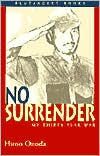

 |

|

The average rating for No Surrender: My Thirty-Year War based on 2 reviews is 4 stars.
Review # 1 was written on 2013-02-22 00:00:00 Reshan Pallie Reshan PallieI read this in one sitting, I couldn't put it down. Five stars because of how crazy it sounds, it sounds like fiction, and the thing is, he wasn't unique, others like him also held out for years. I didn't know what to feel, I felt pity, I felt awe (perhaps a strong word?) and I also found myself feeling frustrated. How can someone be so fanatically deluded? With all the leaflets, radio broadcasts, search parties, how can you still believe it's all a plot by the enemy? Amazing read. I believe he died last year or the year before, what a man. |
Review # 2 was written on 2015-12-06 00:00:00 Wheeler Steffes Wheeler SteffesThis is the memoir of Hiroo Onoda, a Japanese soldier who was sent to Lubang Island in the Philippines during World War II and held out there for the next thirty years in the belief that the war was still ongoing. When Japan began its rescue missions for their holdout soldiers several years after the war, Onoda thought of these efforts as mere American propaganda and evaded contact. He continued to do his war duties even after his comrades' death, "surrendering" only in 1974 after he was finally served an order of dismissal by his former commanding officer. Hiroo Onoda was one of Japan's last World War II holdout soldiers. This book offers an interesting insight about his passion to his duty, which is an act of honor to his Emperor and country. Even when he was initially conflicted by the big difference between guerrilla warfare (to which he was assigned) and their usual open combat that embraces the Bushido Code, he had accepted his task without reservation. He was astute, diligent, and adaptive'cunning, too, which helped reinforce his jungle survival skills. I think a big percentage of his survival had to do with the abundance of food and water in Lubang forests, and the other essentials he and his comrades had procured (or pilfered to be frank) from the lowland residents. That, and his strong commitment to stand fast to his soldierly duties against all odds. I first heard about Onoda from a brief discussion in History class, and later on, from a local TV documentary. While he became some sort of a wartime hero and celebrity in his own hometown, I don't think he got the same worship treatment here, especially in Lubang where there were numerous complaints of the atrocities he had committed against unarmed civilians during his holdout years. He did not mention this in his book. |
CAN'T FIND WHAT YOU'RE LOOKING FOR? CLICK HERE!!!